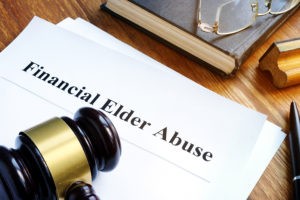Elder Financial Abuse Is Increasing

A September 2018 Forbes report said that elder financial abuse would only get worse as we age. With 10,000 people turning age 65 every day for the decade, the demographics include a growing pool of potentially fragile retirees and the elderly, many of whom are susceptible to financial exploitation.
alphabetastock.com’s recent article entitled “Elder Financial Abuse Is Rising” says that, although the criminals are out there, a lot of elder financial abuse actually begins in the retirement system, because individuals must accumulate and handle a large amount of money designed to last an entire lifetime. With $14.5 trillion in self-directed retirement accounts in the U.S., it’s a big, enticing target for financial predators. This is on top of other forms of elder financial abuse that come from scams online, via phone calls or sometimes even from family.
Elder financial abuse includes all of the frauds and scams targeting seniors and because it’s a hidden crime, many victims opt not to report it. Those that do report the crimes, frequently don’t prosecute.
However, when it comes to trying to promote real changes that will provide some material protections, the investment, insurance, and financial services industries directly or indirectly have been showing some reticence about the potential compliance expense. Some of these companies are lobbying to maintain a status quo—one that’s on a course to see a steady rise in elder financial exploitation.
Many retirement investors think their professional financial advisors are fiduciaries who are legally bound to act in their best interests. However, that’s not always so. Many professional financial advisors need only adhere to a lower legal standard of behavior. They can’t outright tell you a lie—but they can make recommendations that don’t put the customer’s best interests as a top priority.
A GAO study found elder financial abuse to be a growing epidemic. Rather than being able to live out their golden years in safety and financial security, the lack of financial safeguards are leaving an entire (and growing) group of older Americans at risk. These seniors are often left on their own and confused as to how the advisors they entrusted with their financial security are permitted to make moves that are motivated by high commissions and self-interest. These so-called professionals aren’t required by the law to place interests of their clients ahead of their own.
Theft and illegal behavior is one small component of the elder financial exploitation. A bigger part comes from abusive financial practices, such as higher fees and complex and unsuitable advice and recommendations from professional financial advisors who aren’t fiduciaries. It is helpful to occasionally have your financial picture reviewed by another advisor or your friends and family. More eyes may reduce financial elder abuse.
Be sure that you are working with a financial professional who is trustworthy and has your best interests at heart. At The Galligan Law Firm we have worked with many excellent advisors and would be happy to make a recommendation.
Reference: alphabetastock.com (January 11, 2020) “Elder Financial Abuse Is Rising”

